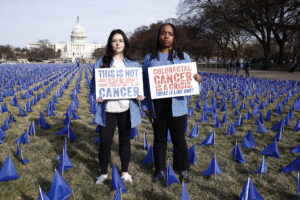Colorectal Cancer Facts

What is Colorectal Cancer?
Colorectal cancer starts in the colon or rectum. Many cases begin as polyps that can be removed before they turn into cancer, which is why early detection is so critical.

Statistics
Colorectal cancer statistics reveal the urgency of our work. Learn the data points that drive Fight CRC’s focus on prevention, research, and early detection.

How Colorectal Cancer Develops
CRC develops when a polyp in the colon or rectum starts to change and becomes cancerous. Removing polyps during screening is one of the most effective ways to stop cancer before it starts.

